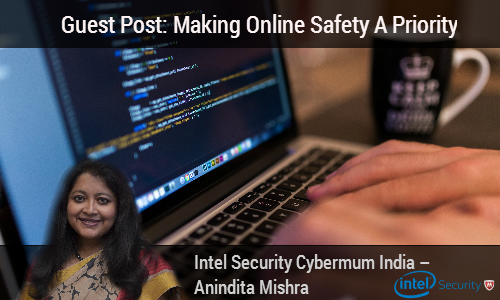Guest Post: Making Online Safety A Priority
We offer our children the best of facilities that can enable them to become happy, healthy, responsible and educated citizens of the country. While we want to understand their needs and desires to in our effort to become the ideal parent, we also remain concerned about their well-being, taking utmost care to ensure that they grow safely as responsible citizens. This concern has become much more profound in the last couple of years as Generation Z – our teens and tweens convert into digitally savvy netizens who want to share and access information at the flick/swipe of a screen. Undoubtedly, it is quite natural for us to jump upon on any new reports / studies that helps us understand how our children are adopting the digital wave.
The Teens Tweens and Technology 2015 carried out by Intel Security is the go to study for me as it should be for every parent. It studies the pattern of online activities among the teens and tweens aged between 8-16 in India in great depth. The good folks at Intel Security unveil their findings annually hence we can take stock of trends over the years.
I personally look forward to this study to understand the new trends among children as they adopt digital technologies. This year’s study also includes information on the behaviour of parents too thus offering a holistic overview of what we as concerned parents think about our children’s online footprints. It thus offers great insights into the changes that have taken place in the attitude towards the online world, and the new concerns in the virtual parenting horizon.
Dear Readers, today, I will be sharing with you, the salient conclusions from the survey which you should be cognizant of:
Starting With Good News: Parents Rated High On Cyber Safety Awareness
This year, the survey has thrown up ONE very positive finding: Parents have become more aware of internet-related threats, thereby starting to educate their children about them. Nearly 91% parents polled said they have discussed the risks of social media with their children, including that of cyber crimes, cyber bullying, identity theft, data stealing and online reputation threats. In addition, 85% of the parents claim they follow their children on social media networks.
Further, most parents want their children to receive online safety or cyber security training in the next 2-5 years to keep their personal information and themselves protected. I believe that this is a good sign of things to come as more parental involvement surely means better guidance for children online and consequently, greater safety for them.
Onto The Concerning News: Children Could Be Fooling You!
The study indicates that some parents considered their children’s knowledge of social media far superior to their own, and this hampers their attempt to monitor their children online. Technology-savvy tweens and teens also know how to hide their social media presence from their parents by using aliases or by deleting search history. Quite a few respondents from children definitely do not want their parents to see their social media pages and confess they would behave differently online if they knew their parents were watching!
But are all parents watching? No, because they do not want to pry on their children’s online life as they trust them. What they are definitely aware of is that the risk of a stranger connecting with their children online is definitely real. And this has them worried. Yet surprisingly, only around 1 out of 6 parents discussed stranger-danger as a topic with their children.
Beware Of Stranger Danger – It’s Real
The survey reveals that almost half (44%) of the youth polled would meet or have met someone in person that they first met online. That’s quite an alarming number, isn’t it?
Children tend to be inquisitive and adventurous by nature. Clearly, they are interested in meeting new people but would this be the most advisable way to doing the same? The answer to the same is a resounding NO! Parents should educate children about how they can interact with new people by taking part in sports or various extracurricular activities but meeting someone in person they met only online should be strictly avoided.
Another finding that came out was that most tweens and teens who were polled maintained that they are conscious of the need for maintaining privacy. However, many unintentionally share details like name, date of birth, photographs, etc. This increases the chance of a cyber criminal preying on them.
Children Admit To Cyber bullying
I can’t help but wonder at the rise in cyber bullying incidents among the children. Most children today are aware that social media platforms are being used to troll and bully; and they are scared of becoming victims themselves. Yet, a large number of those surveyed admitted having bullied someone online by posting something rude or mean about them, exchanging inappropriate language or tagging them in a mean picture.
This calls for serious pondering on the part of the parents in particular and the society as a whole; are we bringing up a generation of rude, vengeful, aggressive children? Cyber bullying indeed calls for serious planning on educating children to become ideal netizens. Don’t you think so too?
Children Could Be Inviting Trouble Online
Despite their awareness, only 42% have said they have never done anything risky online. The rest- which makes it a majority with 58% admitted to doing activities including playing video games with strangers, uploading intimate photos and messages, watching porn, bullying someone, purchasing harmful substance or gambling! Parents should ensure that children are made aware that such risky behaviour can cost them their future and have an impact on their parents too.
The Bottom Line
1. Talk to your children, frequently and openly, about digital threats, hygiene and etiquette. Explain why it is important today to manage one’s digital reputation
2. Monitor and mentor children online – don’t just leave it to the children to work out their problems. Let them know you are there for them if they need support and suggestions.
3. Stay updated on all new social media sites and issues related to those. Ask your children about new sites, their pros and cons and the wisdom of signing up on several sites.
4. Be strict about following online rules yourself and guide children to do the same. Appreciate it when children stick to the rules, like not signing up on Facebook before 13.
5. Use security tools with parental controls on all internet-enabled devices to monitor children online and guide them accordingly.
Till then, ensure your security software is updated and running and talk to your children about cyber safety.
Anindita Mishra is Intel Security’s Cybermum in India. A Pune-based freelance writer, teacher and devoted mother of two – Anindita has always been a vocal advocate for issues tied to children’s welfare and development. Like many Indian parents, Anindita wants to make sure that her children are safe wherever they go, in the real or virtual world. Her blogs are about internet safety and sharing her own experiences, insights and learnings to keep children and families safe online. You can follow Anindita on Twitter @Cybermum_India or via Facebook page: Cybermum India or email her at cybermum.india@gmail.com


